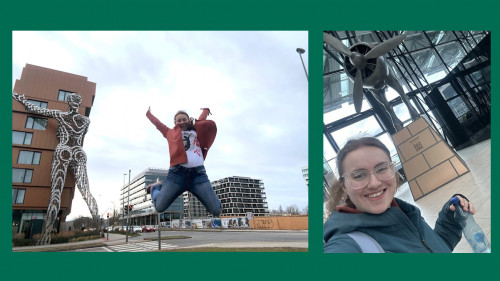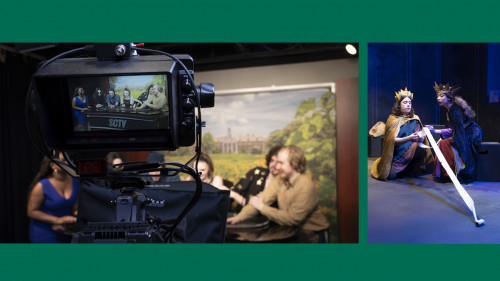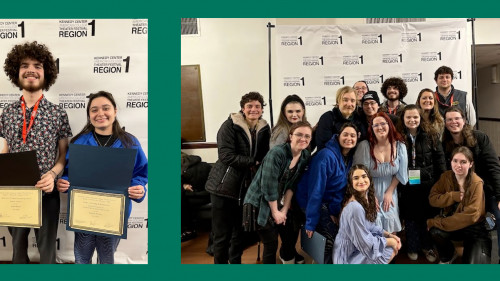
It was a thoughtfully layered approach to examining how we protect our environment: art, science, and panel discussions inspired by both.
“A Call for Holy Rage: Francis of Assisi, Ibsen, and Earth's Future” was presented October 2 as part of Francis Week at Siena. It featured three scenes from the Creative Arts Department’s upcoming production of Enemy of the People, interwoven with panels featuring students from the School of Science, School of Business, and School of Liberal Arts.
Enemy, by Norwegian playwright Henrik Ibsen, concerns the actions of Doctor Thomas Stockmann, a medical officer charged with inspecting the public baths on which the prosperity of his native town depends. He finds the water to be contaminated. When he refuses to be silenced, he is declared an enemy of the people. The play was originally published in 1883, but is especially resonant today given the pushback and political argument surrounding the urgent need to address the climate crisis.
“It’s a very timely piece,” said Krysta Dennis, Ph.D., creative arts producer. “We selected pertinent scenes from the play that show conflict between politics and science, between economics and ethics. Some characters in the play show an anti-science attitude that is eerily relevant to the present day.”
Jack Ellis ’24, played the part of Dr. Stockmann and also stage managed and emceed the event. He explained that performances like “Holy Rage” are known as “applied theatre,” where the audience can explore important concepts through the emotional impact of art.
“One of our goals was to show how personal the environment and its degradation are to every one of us,” said Ellis. He explained that the poor and marginalized in our world are the first and most directly impacted by pollution, a Franciscan lens through which to examine this topic.
The panels explored whether clean, potable water is a human right, as well as the concept of making this issue human-centered, when perhaps all of nature should be properly considered.
Dennis referenced that when promoting the need to protect Mother Earth, Pope Francis often quotes an old Spanish expression: “God always forgives, we forgive sometimes, but nature never forgives.” His 2015 encyclical “Laudato Sí: On Care for Our Common Home” has become an inspiration for those working to protect the planet from the ravages of climate change.
To get into the proper mindset for the event and the upcoming full production, the students visited the famous public baths in Saratoga, and took in an exhibit of works by another Norwegian artist, Edvard Munch, at the Clark Art Institute.
There was a third Norwegian featured in this production: Jesper Schoene Vogtengen ’25, a student athlete from Norway. He represented the School of Business on the panel; Logan Gould ‘24 spoke for the School of Science and Simon Meisel ’24 represented Liberal Arts.
“The student panelists spoke very eloquently on the topics depicted in the scenes,” said Dennis. “They had the audience snapping and clapping in agreement and enthusiasm.”
Vogtengen said he wanted the audience to understand that we all have a responsibility as individuals to preserve the planet.
“It starts small by creating an aware and responsible environment where individuals think and act accordingly to their own and the planet’s best interests,” he said.
“Holy Rage” was sponsored by Siena’s Center for Integral Ecology, Academic Center for Sustainability and the Mission Office together with Creative Art.
A full production of Enemy of the People will be staged by Creative Arts on November 9, 10, 11, 16, 17 and 18 at 8PM, and at 3PM on Nov. 12. It will feature costumes created from environmentally safe fabric dyes and repurposed materials for set design.

